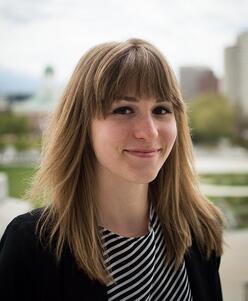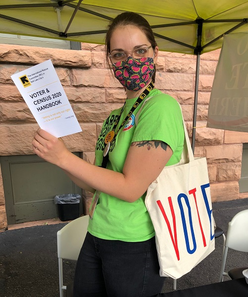When we think about political decisions being made, it makes sense that we would imagine the court room dramas we see on television. In reality though, we know the most important ideas take months, and even years, to develop. They also take a lot of communication, often with everyday people on the local level advocating for what they believe in. This September, a few staff members from the International Rescue Committee (IRC) in Salt Lake City met with a representative from Senator Lee’s office to discuss Utah’s historical dedication to welcoming refugees. The meeting was part of a series of meetings requested with elected officials in the Beehive State.

In previous years, the Presidential Determination on Refugee Admissions would occur in September as a time for the president to meet with congress to discuss how many refugees would be admitted and which countries of origin would be prioritized. Although refugee agencies expect a delay this year as with last year, the time is still arriving for those decisions to be set.
Historically, the average ceiling of refugees admitted to the United States sits around 95,000. This number dropped to 18,000 in 2019. However, the tone in Utah has stayed the same. Utah has a tradition of welcoming refugees. Partially due to its own history, Utah recognizes the plight of persecuted peoples and accepts them into their communities. Just this past fall, Governor Herbert wrote a letter directed to the White House expressing his strong support for refugees and refugee resettlement in Utah.
Olivia Whiteley, the IRC’s Utah state advocacy officer, highlights Utah’s commitment to resettling refugees. She says that as a highly influential country, we have a greater obligation to provide refuge. “We are morally obligated to insist on resettlement,” she says. “They’re human beings and they also contribute to our community. Utah should continue lighting the way.”
Farah’s story:
Farah Al-Hamdani, health promotion coordinator at the IRC in Salt Lake City also joined the call. Farah is a former refugee from Iraq. “Our individual success as refugees or new Americans is a message that the whole refugee community can provide to those who oppose our existence here,” Farah shares.
Farah speaks of the stark transition from being a young mother in Baghdad, Iraq to carrying her dreams on her back. Now when she works with newly arrived refugees to health appointments, she tells them, “Six years ago, I was a refugee like you.” She reassures them by sharing her experience, relating to them on how challenging the first year in the U.S. is. However, the Presidential Determination is the primary factor that determines whether or not Farah can have these conversations with new arrivals.
Tatjana’s story:
Since these discussions with their lofty numbers can become abstract, Tatjana Andrews joined the call to share her personal experience. Tatjana, community & civic engagement coordinator at the IRC in Salt Lake City, is a former refugee from Bosnia.

“I was just five months old when the war in the Balkans started that broke up my country into six different countries,” Tatjana shared during the call. “My mom, dad, three-year-old brother, and I fled to Germany to seek asylum. Five years after that, the United States accepted us as refugees, and we flew to Salt Lake City. My family and I have called Utah our home for over two decades now and I am grateful that we were resettled in such a welcoming state.”
“When I started first grade here, I did not know any English but was immediately accepted to join the jump rope team, which I was also not very good at. I continued to see that welcoming spirit as I grew older, and when I started working with refugees as well.”
“As I see refugee resettlement numbers drastically decline, I see my family being denied,” Tatjana shared during the call. “And I see myself on the other side. I see the possibility of having to return to a war-torn country, where I definitely would not have been on the jump rope team or probably even had a childhood to recall.
“Just like my family did, refugees are seeking freedom to survive and be able to build new dreams and pursue them in the United States.”
You can join our efforts to advocate for refugee resettlement and refugees in our community by visiting Rescue.org/Act. Sign up to receive our text message Advocacy Alerts by texting RESCUE to 40649.